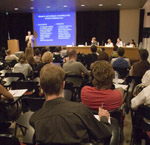01/08/2008 - Events
Available presentations of scientific meeting on doping organized by Jordi Segura
Last Tuesday 22 July, in the framework of the Euroscience Open Forum (ESOF 2008), the session ‘Doping and society: towards the perfect human machine?’ was held, with the aim of providing a general overview of the fight against doping from different viewpoints: scientific, institutional, ethical and the viewpoint of the athletes themselves.
The scientific session was organized by Dr Jordi Segura, director of the Anti-doping Laboratory of the Municipal Institute of Medical Research (IMIM) in Barcelona and member of the Medical Commission Games Group of the International Olympic Committee, who gave us a general introduction about the current state of doping and its control and offered us a summary of the forecast for the near future. View presentation
It had also the participation of experts in the field of doping and sport such as:
- Dr. Franchek Drobnic. Director of the Physiology Department at the Olympic Training Centre (CAR) in Sant Cugat. His presentation described the possibilities for administering prohibited products to those affected athletes who need them. In its two versions (conventional and abbreviated), “Therapeutic Use Exemptions” will provide the relevant medical information for the use of these medicines in pathological situations where there are no other alternatives. The presentation highlighted some of the most common therapeutic use requests, such as those related to athletes with asthma or exercise-induced asthma. See presentation
- Xavier O'Callaghan, former handball player on FC Barcelona and current manager of the handball division of FC Barcelona. He presented us his vision of doping both from a viewpoint as an athlete and as a sport manager. From his personal vision and based on his sports experience, Xavier 0’Callaghan tried to answer the question of why there are athletes who use drugs and others who choose not to and what factors can influence this decision. See presentation
- Michelle Verroken, Director-founder of Sporting Integrity, a consultancy which aim is to advise its clients about good sport practices and to adopt and maintain the best procedures related to sport ethics and integrity. Mrs Verroken spoke about clean sport ethics and the need for all of us to be aware of the importance of this control. According to Verroken, the rules of the game should be the essence of sport. Sport’s corruption through doping is destroying this sole ethical principle. Athletes often become the interpreters, who are trained using training systems that use the latest scientific innovations. Drawing the line between what is acceptable and inacceptable is becoming increasingly difficult. See presentation
- Francesco Botrè, former president of the World Association of Anti-Doping Scientists (WAADS) and director of the Anti-doping Laboratory in Rome. His presentation spoke of the activities performed at anti-doping laboratories that WADA-accredited; carrying out a study on the evolution they have followed in recent years to become more effective in the fight against doping. He placed special emphasis on the future evolution of doping science, taking a position that is pro fair play, health protection and society’s knowledge of the work done at an anti-doping laboratory.
- Finally, Josep Guardiola, former football player and current trainer of the first football team of FC Barcelona. His participation was done via a pre-recorded statement since at the time of the session he was out of the country. He gave his personal viewpoint on doping. The priority issues that he discussed were his vision of doping and its control from a sport perspective, the role that can be played by the environment closest to athletes, his own experience due to being suspected of doping, some considerations about the future of the anti-doping fight and what role science can play in the improvement of controls. Watch video
Society must be aware that media, economic and social prestige of being the winner of important competitions will continue stimulating the temptation to employ illegal practices to obtain this goal and, therefore, it is very difficult to definitively eliminate the problem, above all in individual sports where results depend on the strength and resistance of one person. However, it does seem possible to control the situation within certain limits that allow faith in clean sport practices to be maintained.
More news

